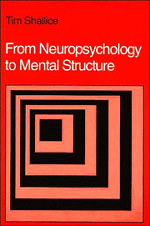Book contents
- Frontmatter
- Contents
- Preface
- I Introducing Cognitive Neuropsychology
- II Converging Operations: Specific Syndromes and Evidence from Normal Subjects
- III Inferences from Neuropsychological Findings
- 9 On Method: A Rejection of Ultra-Cognitive Neuropsychology
- 10 On Method: Single-Case Studies
- 11 Functional Specialisation
- IV Central Processes: Equipotentiality or Modularity?
- References
- Subject Index
- Author Index
- Index of Patients Cited
11 - Functional Specialisation
from III - Inferences from Neuropsychological Findings
Published online by Cambridge University Press: 21 October 2009
- Frontmatter
- Contents
- Preface
- I Introducing Cognitive Neuropsychology
- II Converging Operations: Specific Syndromes and Evidence from Normal Subjects
- III Inferences from Neuropsychological Findings
- 9 On Method: A Rejection of Ultra-Cognitive Neuropsychology
- 10 On Method: Single-Case Studies
- 11 Functional Specialisation
- IV Central Processes: Equipotentiality or Modularity?
- References
- Subject Index
- Author Index
- Index of Patients Cited
Summary
Delusions about Dissociations?
The cognitive neuropsychologist shares a conceptual problem with the archaeologist – to infer from a changed system the properties of the original one. Archaeologists have recently begun to consider the inference problem from the other perspective (for a review, see Hodder, 1982). What physical legacy, they have asked, would a society of the type being studied in fact leave? As an illustration of the dangers of making too direct an inference from the data, consider what could be inferred in future about recent Eskimo settlements from the tool remains that would be likely to be left. One would, for instance, find it very difficult to deduce the existence of some of the tools most valuable to the society. The use of other easily made or frequently broken artefacts would be simple to observe, but tools such as bone spears are highly ‘curated': carried round, cared for, and reused, and if they are lost or discarded, this normally occurs away from the home site (Binford, 1976). Other things would be left behind, but probably not bone spears! Thus there would be real dangers of theorising inappropriately about the society from what was left. To lessen this danger, there has developed a new field intermediate between archaeology and anthropology – ethnoarchaeology – which studies what traces existing societies would or would not leave.
That neuropsychology might be subject to an analogous danger is illustrated by the development of ideas on dissociations.
- Type
- Chapter
- Information
- From Neuropsychology to Mental Structure , pp. 245 - 266Publisher: Cambridge University PressPrint publication year: 1988
- 1
- Cited by



